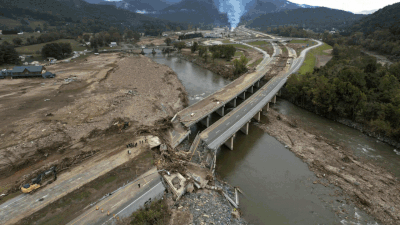
As Florida braces for the arrival of
Hurricane Milton
, the aftermath of
Hurricane Helene
is being further complicated by a torrent of
conspiracy theories
and
misinformation
. These baseless claims have worsened the challenges for recovery teams trying to provide aid to devastated communities, making an already dire situation even more complex.
FEMA faces false claims of fund misappropriation
Hurricane Helene, which struck on September 26, left over 225 people dead across multiple states, from Florida to North Carolina.
Yet, as federal and local relief efforts ramp up, misinformation has emerged online, further muddying the recovery process. Among the most persistent conspiracy theories is a claim that FEMA misappropriated disaster relief funds to support undocumented immigrants.
This claim, pushed most prominently by former President Donald Trump, has been widely debunked. Trump has asserted, without evidence, that "Biden and Harris had used federal emergency funds on people that should not be in our country." Deanne Criswell, head of FEMA, firmly denied this, saying, "This kind of rhetoric is not helpful to people." Independent fact-checkers and FEMA officials explained that disaster recovery funds are separate from programs aimed at aiding migrants.
Weather control conspiracy: Targeting republicans?
Another troubling theory making waves suggests that the US government can control the weather, and that Hurricane Helene was deliberately steered toward Republican-voting areas to influence the upcoming presidential election. This baseless idea, amplified by far-right figures like Rep Marjorie Taylor Greene, has gained traction on social media platforms, particularly on X (formerly Twitter).
“Yes, they can control the weather,” Greene posted, further fueling the false narrative. The claim, which echoes similar theories from past natural disasters, suggests that Democrats, led by President Biden and Vice President Kamala Harris, used Helene as a political weapon to harm Republican voters.
Dam and body disposal hoaxes spread fear
Other conspiracy theories have spread panic in the hardest-hit areas. In North Carolina, one false claim suggested a dam was about to burst, leading to unnecessary evacuations. Another rumor, widely circulated online, alleged that FEMA was planning to bulldoze bodies under the rubble in some towns. These stories, despite being false, have added to the chaos and distrust in the recovery process.
Criswell warned that such baseless claims create fear and prevent residents from seeking much-needed aid. "It has a tremendous impact on the comfort level of our own employees to be able to go out there," she said, noting that the disinformation has even led to threats against FEMA workers.
Efforts to debunk the misinformation
Authorities have taken steps to debunk the most dangerous falsehoods. FEMA has launched a rumor control page to counteract the conspiracy theories and provide accurate information to the public. Local leaders from both parties have also stepped in to calm tensions. Glenn Jacobs, Republican mayor of Knox County, Tennessee, urged citizens to "put aside the hate for a bit and pitch in to help."
Yet, despite efforts to curb the spread of misinformation, conspiracy theories continue to flourish, especially on platforms like X, which has become a hub for right-wing disinformation since being acquired by Elon Musk. Some of the most viral posts, including those claiming federal authorities are withholding aid from Republican areas, have garnered millions of views.
Political misinformation clouding recovery efforts
As federal and state officials work tirelessly to restore devastated communities, the political atmosphere surrounding Hurricane Helene continues to escalate. President Biden has emphasized that his administration "will continue working hand-in-hand with local and state leaders – regardless of political party." However, the spread of false information has led to a growing distrust in government efforts, particularly in Republican-leaning areas.
With Hurricane Milton now expected to make landfall later this week, officials worry that the disinformation surrounding Helene could further erode trust in disaster relief efforts, making it harder to protect vulnerable communities from future storms.
(With inputs from agencies)

 1 month ago
17
1 month ago
17










 English (US) ·
English (US) ·